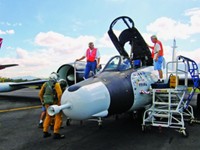Advertisement
Grab your lab coat. Let's get started
Welcome!
Welcome!
Create an account below to get 6 C&EN articles per month, receive newsletters and more - all free.
It seems this is your first time logging in online. Please enter the following information to continue.
As an ACS member you automatically get access to this site. All we need is few more details to create your reading experience.
Not you? Sign in with a different account.
Not you? Sign in with a different account.
ERROR 1
ERROR 1
ERROR 2
ERROR 2
ERROR 2
ERROR 2
ERROR 2
Password and Confirm password must match.
If you have an ACS member number, please enter it here so we can link this account to your membership. (optional)
ERROR 2
ACS values your privacy. By submitting your information, you are gaining access to C&EN and subscribing to our weekly newsletter. We use the information you provide to make your reading experience better, and we will never sell your data to third party members.
Physical Chemistry
Cosmic Rays Promote Aerosol Formation
by Jyllian Kemsley
August 29, 2011
| A version of this story appeared in
Volume 89, Issue 35
Cosmic rays can incite up to a 10-fold increase in the nucleation rate of atmospheric aerosol particles from sulfuric acid vapor, according to a study published in Nature (DOI: 10.1038/nature10343). Aerosol particles play a role in both human health and climate, and a better understanding of the role of cosmic rays in aerosol formation may help elucidate solar effects on climate variability. Scientists conducted the cosmic ray experiments as part of the Cosmics Leaving Outdoor Droplets (CLOUD) project, in which cosmic rays are simulated using a proton accelerator at CERN, the European Organization for Nuclear Research. The researchers, led by CERN physicist Jasper Kirkby, studied the effects of cosmic rays on the nucleation of H2SO4 particles in a chamber filled with humidified N2, O2, and traces of H2SO4. Kirkby and colleagues found that cosmic rays led to a twofold to 10-fold increase in nucleation rate, depending on the temperature. They also found that ammonia is critical to aerosol particle formation, with particles nucleating fastest when they grow in a 1:1 NH3:H2SO4 ratio. But even with cosmic ray and ammonia enhancements, experimental nucleation rates did not match those observed in the field, so other compounds must also play a role, the researchers say.




Join the conversation
Contact the reporter
Submit a Letter to the Editor for publication
Engage with us on Twitter